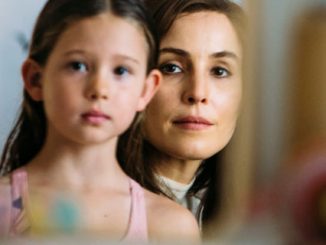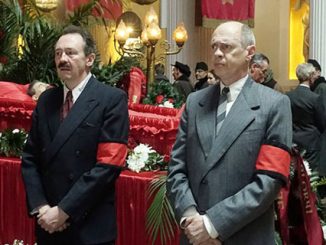
Sure, the Alliance Française French Film Festival has its fair share of crowd-pleasing arthouse hits and light romantic comedies, but you can see them any time, right? So when the organisers offered a whole bunch of preview screeners to check out, naturally I went looking for the unusual, the daring, the wildest and most wonderful – the sort of films you can only see in film festivals. And director Phillip Platel didn’t disappoint, of the 53 films he chose to screen this year, he managed to find some rare beauties.
These five are all provocative, exciting and thoughtful. And isn’t that why we go to the cinema? (ok, I do know about Captain Marvel…)
Revenge
As if to prove French women are really not reactionary slouches on #MeToo, writer/director Coralie Fargeat’s blistering assault on men who behave badly literally takes no prisoners. She sprays so much blood across the screen she must have ordered a tanker load of the fake red stuff. Three hunters on a desert adventure assault and attempt to murder the girlfriend (Matilda Lutz) of one of them (Kevin Janssens) after she resists a thuggishly crude advance. They leave her for dead, but she survives and stalks them to their doom – all in her blood-soaked undies and (ludicrously) bare feet. There’s quite a few loving lingering shots of her bottom (a French feminist filmmaker can to do that, apparently) but before you can say “male gaze”, one of the dudes cops a knife right in the eyeball. So there you go…

More spectacularly gory scenes follow, Fargeat’s style is visceral and starkly muscular, with eye-popping colours and incredibly punchy visuals. The last showdown with the most revolting of the beta-male rapists (who is completely naked throughout it – in fact, oddly for a French film, the only full frontals are male) is bravura filmmaking at its most terrifying. His torso slashed and oozing vital organs – he bandages himself up in glad-wrap. Surely only a Frenchman would do that! Do check the trailer and note the R18+ rating. ★★★★
At War
As its title suggests there’s violence aplenty in Cannes darling Stephane Brizé’s En Guerre (At War) too, but it’s a very different kind to that meted out by the feminist Rambo of Revenge. Pretty well all of it occurs in boardrooms, meeting halls and labour dispute courts – and it’s the silent but deadly real-life cruelty of class. A sensational Vincent Lindon stars as a unionist who leads the resistance to a regional factory employing 1100 being shut down – just so its German owners can bump up dividends for its shareholders. The workers had previously agreed to considerable pay cuts and efficiencies, but now the ever-so-reasonable and urbane managers and their lawyers don’t even want to sell the facility – they’re after it’s asset valuation, not a potential competitor.
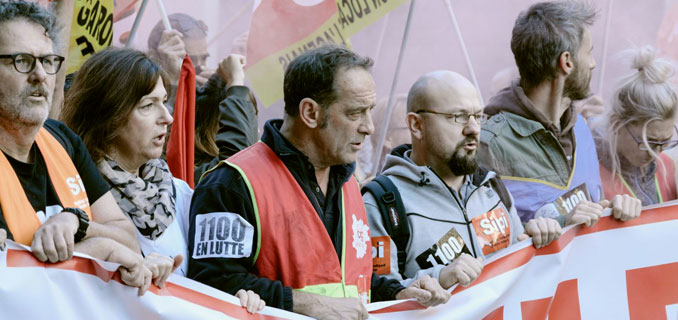
This is capitalism in all its naked brutality. In its very first scene of what appears at first to be a docudrama, we’re dropped right in the middle of the struggle – a gruelling back-and-forth of endless conversations, arguments, shouting sessions and confrontations as shaky hand held cameras frame the intrigue and convincing TV news reports fill in the blanks. What follows is a sensationally insightful and forensic look inside the guts of social activism – and sadly, its limitations. Unfortunately, the raw, undeniable power of this gem is undercut by an unnecessarily melodramatic ending. But no matter… To understand why the “gilets jaunes” protestors are rampaging through the streets of Paris every weekend, this is the festival film you must see. MA15+ ★★★★1/2 View the trailer
Sophia Antipolis
Virgil Vernier’s more experimental approach to the effects France’s hyper capitalist ethos is having on its citizens is the sort of film that will never be shown outside of festivals. It’s a loosely connected series of dreamy vignettes, all following a group of people living in the Silicon Valley-like technology park of the title – a high tech modern urban centre in the South between Nice and Cannes. Bringing back memories of Jean-Luc Godard’s Alphaville, it’s a tough watch. Not because there’s anything particularly confrontational – though its extended and strikingly graphic presentation of breast surgery in an early sequence, which mercifully stops at the first slice under the nipple – is pretty damn queasy. It’s more that the “Lynchian quality to the anaesthetized and haunting atmosphere” as Hollywood Reporter describes it, makes everything densely opaque.
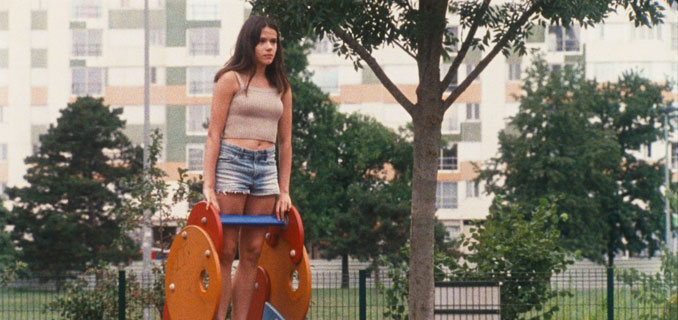
Strange things keep happening though – who is that creepy self improvement guru, and what’s everyone doing in those dim gloomy motel rooms? The stories keep circling back to the scene of a charred dead body of a girl, so its impossible not to be drawn into its intrigue. But confused too – especially by the casual brutal violence melted out a group of vigilante security guards patrolling their city to keep it “safe”. But for who? And where is the threat coming from? This is one for the festival boffins, the ones who want to say “I sat through the brainiest and oddest film of the fest.” Or what Hollywood Reporter calls an exploration of “the hidden, unsettling depths of a country in quiet turmoil.” Vive la France, I guess… MA15+ ★★★1/2 View the trailer
Amanda
Enough of the wild and the weird, now for the “wonderful”’ and a film that even after two viewings, still brings on the sniffles just thinking about it… David (Vincent Lacoste) is a likeable knock-about 24-year-old in Paris, working precariously in the gig economy and just beginning a romance with Léna (the always lovely Stacey Martin), when a brutal tragedy means he is suddenly called on to care for his seven-year-old niece, Amanda (an astonishingly assured Isaure Multrier). In most movies with this sort of set-up, we’d expect all sorts of “life-lessons” along with a bit lame comedy about unexpected parenting, but here director and co-writer Mikhaël Hers delicately explores David and Amanda’s new situation with astonishing sensitivity and a rare poignance.
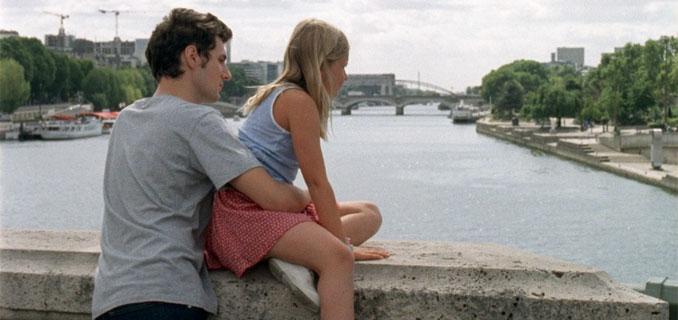
It’s a warm and sincere, beautifully acted film about love and resilience in the face of loss – and what makes it all too relevant is that their circumstances are the result of an horrific act of terrorism. That’s not hammered home, Amanda is no polemic or exploitative melodrama. This is just life and death as it is for the French now, and the reason for David and Amanda’s pain is just “there,” hovering in the background, always present… The scene which inevitably tears me up is so low-key it could easily be overlooked: Stunned and morose the day after the pair go for a walk in their Paris neighbourhood, a city that up til now, has looked as gloriously care-free and lyrically wonderful as it always does on film. But it’s deserted, the streets and cafes empty. “Not a good day to be out and about in Paris” a heavily armed and helmeted policeman tells them. Maybe not a good time to live in France. MA15+ ★★★★1/2 View the trailer
Genesis
Growing up, falling in love and dealing with burgeoning sexual identity are common themes in contemporary cinema, but rarely are they so sensitively (and brutally) addressed as in Canadian writer-director Philippe Lesage’s gorgeously assured second feature, Genesis. The first two of its nervy and tender three acts focus largely on the relationship dramas of a pair of well-to-do siblings living in suburban Quebec. Guillaume (Théodore Pellerin) is a good-looking, quick-witted trouble-maker at an all-boys boarding school, secretly in love with his sports-loving his best mate, Nicolas (Jules Roy Sicotte). Meanwhile his straight step sister Charlotte (Noée Abita) feels her noncommittal boyfriend Maxime (Pier-Luc Funk) is taking her for granted, so sets off looking for love in all the wrong places.
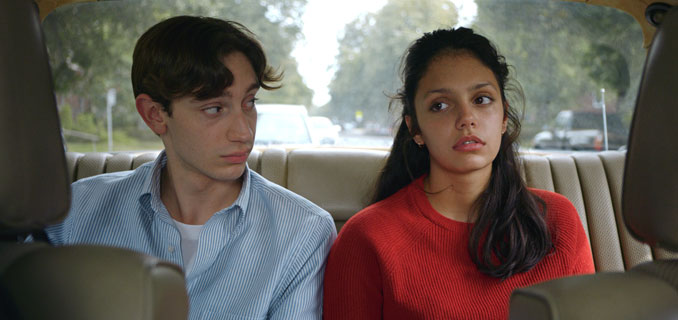
None of their libidinous yearnings end well, and though Charlotte’s experience at a drunken party is by far the most harrowing, its the fate of Guilliane that feels the most poignant. After one of the drollest and most wince-inducing coming out scenes ever put on film – he address a whole classroom of teenage boys who end up giving him a standing ovation (Québécois adolescents must be different!) – things don’t quite go as expected. Both acts end on a sombre note, but then Lesage does a complete U-turn – and gives us an extended epilogue of younger teenage love which is so transcendently joyful, tender and lyrical, that only then does the meaning of the the movie’s title become clear. This act is mostly filmed in dewey, sun-dappled glorious light, and sure, its sunny and bright now. But rain storms are just around the corner. MA15+ ★★★★ View the trailer
* There’s plenty more adventurous fare you can check out. Two I’ll be making a bee-line for are Claire Denis’ sexy sci-fi flick High Life, which puts Juliette Binoche together with Robert Pattinson on a prison spaceship hurtling into outer space, and a zombie film like no other, The Night That Eats The World. So what would you do if the world turns from normal to undead in the space of an evening, and you only have your neighbour, already a flesh eater, for company?
The 30th Alliance Française French Film Festival runs all this month at Palace Cinemas and into April, and there a multiple sessions of most films. Trailers, info and bookings here
Sydney 5 Mar-10 Apr; Melbourne 6 Mar-10 Apr; Canberra 7 Mar–10 Apr; Perth 13 Mar–10 Apr; Brisbane 14 Mar–14 Apr; Hobart 14 Mar–23 Apr; Adelaide 21 Mar–18 Apr; Avoca Beach 22-27 Mar; Parramatta 28-31 Mar.
Reviews – Russell Edwards

